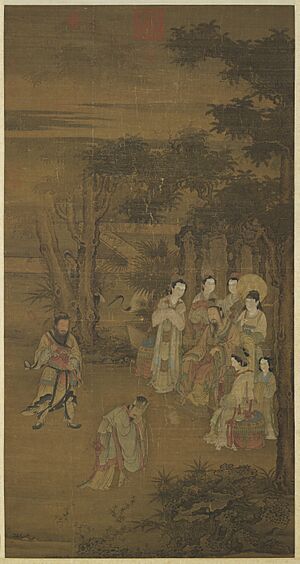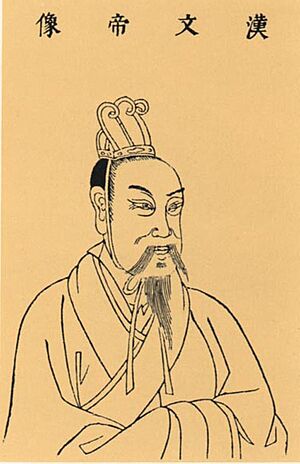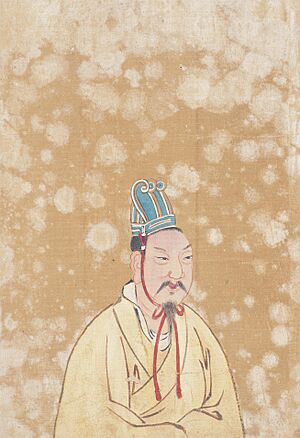Emperor Wen of Han facts for kids
Quick facts for kids Emperor Wen of Han漢文帝 |
|||||||||||||
|---|---|---|---|---|---|---|---|---|---|---|---|---|---|
| Huangdi (皇帝) | |||||||||||||
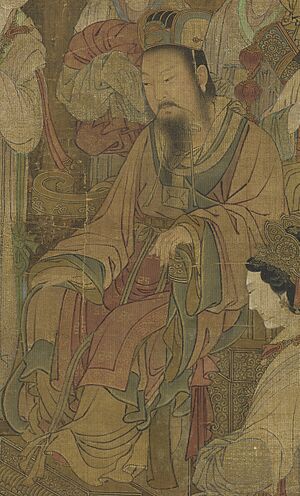
Posthumous Song dynasty depiction of Emperor Wen, detail from the hanging scroll, Refusing the Seat
|
|||||||||||||
| Emperor of the Han dynasty | |||||||||||||
| Reign | 14 November 180 – 6 July 157 BC | ||||||||||||
| Predecessor | Emperor Houshao (Under Empress Lü's regency) |
||||||||||||
| Successor | Emperor Jing | ||||||||||||
| Born | Liu Heng (劉恆) 203/02 BC Chang'an, Han dynasty |
||||||||||||
| Died | 6 July 157 BC (aged 46) Chang'an, Han dynasty |
||||||||||||
| Burial | Ba Mausoleum (霸陵) | ||||||||||||
| Consorts |
|
||||||||||||
| Issue |
|
||||||||||||
|
|||||||||||||
| House | Liu | ||||||||||||
| Dynasty | Han (Western Han) | ||||||||||||
| Father | Emperor Gaozu | ||||||||||||
| Mother | Empress Gao | ||||||||||||
Emperor Wen of Han (Chinese: 漢文帝), whose personal name was Liu Heng (劉恆), was an important emperor of the Han dynasty in China. He ruled from 180 BC until his death in 157 BC. He was the fifth emperor of the Han dynasty.
Emperor Wen was the son of Emperor Gao and Consort Bo. His time as emperor brought much-needed peace and order to the ruling Liu family. Before him, there was a difficult period when Empress Lü was in charge. The reigns of Emperor Wen and his son, Emperor Jing, are remembered as a time of great success. Historians call this period the "Rule of Wen and Jing".
When Emperor Gaozu stopped a rebellion in the Dai region, he made Liu Heng the Prince of Dai. After Emperor Gaozu died, Empress Lü, his wife, held most of the power. But after Empress Lü passed away, officials removed her powerful family. They chose Liu Heng to be the new emperor. They picked him because his mother, Consort Bo, did not have powerful relatives. Her family was known for being humble and thoughtful.
Emperor Wen's rule brought political stability. This helped set the stage for a time of great wealth and success under his grandson, Emperor Wu. Historians say that Emperor Wen trusted his ministers and asked for their advice on important matters. His wife, Empress Dou, followed Taoism. Because of her influence, Emperor Wen tried to avoid wasting money. Taxes were very low during his reign, sometimes as low as 1.67% of property value. Warehouses were so full of grain that some of it even spoiled.
Contents
Life of Emperor Wen
Becoming the Prince of Dai
In 196 BCE, Emperor Gao defeated a rebellion led by Chen Xi. This happened in the Dai region. After this victory, Emperor Gao made his son, Liu Heng, the Prince of Dai. Liu Heng's mother was Consort Bo. The capital city of this area was Jinyang, which is now Taiyuan in Shanxi province.
The Dai region was near the borders with the Xiongnu people. Emperor Gao likely created this principality to help defend against Xiongnu attacks. When Liu Heng became Prince of Dai, he was only seven years old. He probably moved to Dai around this time.
Later, in 181 BCE, Liu Heng's half-brother, Prince Liu You of Zhao, died in prison. Then, another half-brother, Liu Hui, became Prince of Zhao. After Liu Hui's death, Grand Empress Dowager Lü was in charge of the government. She offered the richer Principality of Zhao to Prince Heng. However, Prince Heng wisely turned down the offer. He knew she wanted to make her nephew, Lü Lu, prince of Zhao. Prince Heng said he preferred to stay on the border. So, the Grand Empress Dowager made Lü Lu the Prince of Zhao instead.
During these years, the Principality of Dai became very important for defending against the Xiongnu. Prince Heng learned a lot about Xiongnu customs and their military ways.
How Emperor Wen Became Emperor
In August 180 BCE, Grand Empress Dowager Lü died. After her death, government officials staged a coup d'etat. They removed and killed her powerful family members during the Lü Clan Disturbance. After thinking it over, the officials offered the throne to Prince Heng. They chose him over Prince Liu Xiang of Qi, who was Emperor Gao's oldest grandson.
The main reason for their choice was that Prince Xiang's mother's family was very powerful. The officials worried they might act like the Lü family. But Prince Heng's mother's family, the Bos, were known for being kind and humble.
After some thought, Prince Heng, who was 23 years old, accepted the throne. He became Emperor Wen on November 14, 180 BCE. His nephew, Emperor Houshao, was removed from power and executed. Many believed Emperor Houshao was just a puppet of Grand Empress Dowager Lü. They also suspected he was not truly the son of Emperor Wen's older brother, Emperor Hui.
Emperor Wen's Early Rule
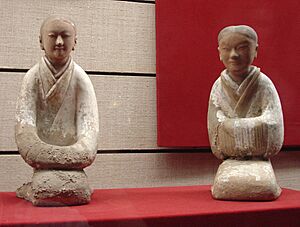
Emperor Wen quickly showed he was a skilled ruler. He worked hard to govern the empire and truly cared about his people. His wife, Empress Dou, followed Taoism. Because of her, Emperor Wen ruled with a policy of not interfering too much in people's lives. He also made laws less strict. In his personal life, he was known for being thrifty and forgiving.
At first, he greatly respected Zhou Bo, Chen Ping, and Guan Ying. These officials helped him become emperor. They served as his prime ministers one after another.
Here are some examples of Emperor Wen's policies that showed his care for the people:
- In 179 BCE, he stopped a law that allowed the arrest of parents, wives, and siblings of criminals. The only exception was for the crime of treason.
- He started a government program to help those in need in 179 BCE. Widowers, widows, orphans, and seniors without children could get loans or tax breaks. He also ordered monthly payments of grain, wine, and meat for seniors over 80. Those over 90 received extra payments of cloth and cotton.
- In 179 BCE, he made peace with Nanyue. Empress Dowager Lü had upset Nanyue's king, Zhao Tuo, with trade restrictions. This had led to attacks on the Principality of Changsha and the Commandery of Nan. Emperor Wen wrote humble letters to Zhao Tuo, offering peace. He also took care of Zhao Tuo's relatives who still lived in his hometown.
- In 178 BCE, after a solar eclipse (which people saw as a sign of divine displeasure), he asked officials for honest feedback. He also asked them to suggest capable people for government jobs. He tried to lower mandatory taxes and reduce forced labor.
In 179 BCE, Emperor Wen made his oldest son, Liu Qi, the Crown Prince. He also made Prince Qi's mother, Consort Dou, the Empress. He had thought about giving the throne to someone else, like a wise person or a relative, but decided against it.
Emperor Wen also liked Consort Shen. Even though she was a favorite, she wore simple clothes instead of fancy ones. This was to save money.
Early in his reign, Emperor Wen was impressed by a young official named Jia Yi. However, older officials disagreed with Jia Yi's ideas. So, Emperor Wen did not give Jia Yi very high positions. Instead, Jia Yi taught different princes. Jia Yi suggested dividing the larger areas ruled by the imperial family's branch lines. Emperor Wen agreed but never actually did it. This decision might have contributed to the Rebellion of the Seven States later on.
Emperor Wen's Middle Rule
An unusual event happened in 176 BCE. Zhou Bo, who had helped Emperor Wen become emperor, was falsely accused of treason. He had already retired. Instead of investigating first, Emperor Wen had Zhou Bo arrested. Zhou Bo was only released after his mother, Empress Dowager Bo, and his daughter, Princess Changping, spoke up for him. The charges were then dropped.
In 175 BCE, Emperor Wen allowed anyone to mint copper and tin coins. This was against the advice of Jia Yi. People who had access to copper benefited most from this. This included Deng Tong, a favorite of Emperor Wen, who received a large copper mine. Liu Pi, the Prince of Wu, also benefited because his area had a big copper mine.
In 174 BCE, a big problem arose with Liu Chang, the Prince of Chen. He was Emperor Wen's only living brother. Emperor Wen loved him very much and did not punish him for using imperial styles and ceremonies. Prince Chang also made his own laws and appointed his own prime minister, which was against imperial rules. He even carried out executions and gave titles to people, powers only the emperor had.
Emperor Wen often excused his brother's wrongdoings. This included killing Shen Yiji. But eventually, Emperor Wen became unhappy. He asked his uncle, Bo Zhao, to write a letter to Prince Chang to try and change his ways. Instead, Prince Chang was offended and planned a rebellion. When the plot was discovered, Emperor Wen took away Prince Chang's title. He sent him away to Yandao, intending to teach him a lesson and then bring him back. However, Prince Chang died on the way. In 172 BCE, Emperor Wen missed Prince Chang greatly. He made Prince Chang's sons marquesses, again against Jia Yi's advice.
Also in 174 BCE, when the Xiongnu's new leader, Laoshang, came to power, Emperor Wen continued the heqin policy. This meant he gave a princess to Laoshang in marriage to keep the peace.
In 170 BCE, Emperor Wen's uncle, Bo Zhao, killed an imperial messenger. Emperor Wen forced Bo Zhao to take his own life. Some historians later criticized this. They thought Emperor Wen should have limited Bo Zhao's power earlier to save his life.
In 169 BCE, Chao Cuo, a low-level official, gave Emperor Wen ideas for dealing with the Xiongnu. Emperor Wen was impressed and made him part of Crown Prince Qi's household. At Chao Cuo's suggestion, Emperor Wen started a new policy in 168 BCE. People who gave food to the northern defense force against the Xiongnu could receive titles or have their crimes forgiven.
Emperor Wen's Later Rule
Later in his reign, Emperor Wen became interested in superstitions and supernatural events. In 165 BCE, a sorcerer named Xinyuan Ping convinced him to build a temple for five gods. Emperor Wen promoted Xinyuan and gave him many treasures. Xinyuan also suggested a big change to the government system and building many temples. In 164 BCE, Xinyuan Ping had someone place a jade cup with mysterious writings outside the palace. He also predicted a strange movement of the sun. Emperor Wen was very happy and declared a festival across the empire. He also restarted the calendar for his reign. So, the years from 163 BCE onward were called the "later era" of his reign. However, in winter 164 BCE, Xinyuan was found to be a fraud. He and his family were executed. This ended Emperor Wen's interest in the supernatural.
In 158 BCE, the Xiongnu attacked the Commanderies of Shang and Yunzhong. Emperor Wen visited the army camps that were preparing to defend the capital, Chang'an. During this visit, he was very impressed with Zhou Yafu, the son of Zhou Bo. Zhou Yafu was a military commander. Other generals stopped everything to welcome the emperor. But Zhou Yafu kept his soldiers on alert. He made the imperial guards follow military rules before allowing the emperor's group to enter. Later, Emperor Wen told Crown Prince Qi that if there were military emergencies, he should make Zhou Yafu the commander of the armed forces. This advice was followed during the Rebellion of the Seven States.
Emperor Wen died in the summer of 157 BCE. His son, Crown Prince Qi, became the next emperor. In his will, Emperor Wen asked for a short mourning period of only three days. This was much shorter than the usual long periods of mourning, which stopped weddings, sacrifices, and eating meat. This greatly reduced the burden on the people. He also ordered that his concubines be allowed to return home. Usually, imperial concubines without children had to guard the emperor's tomb for the rest of their lives.
Emperor Wen's Legacy
Emperor Wen's reign, along with his son Emperor Jing's, is often called the "Rule of Wen and Jing". This period is famous for being stable and having relaxed laws. Emperor Wen is seen as one of the kindest rulers in Chinese history. His time as emperor was marked by saving money and trying to make life easier for the people. The tax rate during his reign was one of the lowest in Chinese history. Two years after his death, the tax rate was as low as 3.3% of a person's income. Emperor Wen was buried in the Baling mausoleum. This huge project required two groups of 16,000 and 15,000 workers.
Emperor Wen's kind way of ruling was influenced by the ideas of Confucianism. The Confucian scholar Jia Yi was a key person behind Emperor Wen's policies. He strongly believed that farming was important. He also thought that wealth should be shared fairly, following the teachings of Confucius.
Emperor Wen was also known for his filial piety, which means deep respect for parents. He is listed as one of The Twenty-four Filial Exemplars. One story says that Emperor Wen's mother was sick for three years. Emperor Wen took care of her whenever he could. He even tasted all the soups and medicines for his mother himself. He wanted to make sure they were good before giving them to her.
Era Names
The "era names" for Emperor Wen's reign are not like the official era names used later by his grandson, Emperor Wu. Emperor Wen simply referred to the number of years in his reign. However, he did reset the calendar once because of the sorcerer Xinyuan Ping. Because of this, historians refer to the periods before and after the reset separately.
- Qianyuan (前元, "Former Era") 179 BCE – 164 BCE
- Houyuan (後元, "Later Era") 163 BCE – 157 BCE
Family
Emperor Wen had several consorts and children:
- Princess consort, of the Lü clan (王后 呂氏)
- Four unnamed sons
- Empress Xiaowen, of the Dou clan (孝文皇后 竇氏; died 135 BCE), her personal name was Yifang (漪房)
- Eldest Princess Guantao (館陶公主; 189–116 BCE), her personal name was Piao (嫖). She was the first daughter.
- She married Chen Wu, Marquis Tangyi (陳午; died 130 BC), and they had children, including Empress Chen.
- Liu Qi, Emperor Xiaojing (孝景皇帝 劉啟; 188–141 BCE). He was the first son.
- Liu Wu, Prince Xiao of Liang (梁孝王 劉武; 184–144 BCE). He was the second son.
- Eldest Princess Guantao (館陶公主; 189–116 BCE), her personal name was Piao (嫖). She was the first daughter.
- Furen, of the Shen clan (夫人 慎氏)
- Unknown
- Liu Can, Prince Xiao of Dai (代孝王 劉參; died 162 BCE). He was the third son.
- Liu Yi, Prince Huai of Liang (梁懷王 劉揖; died 169 BCE). He was the fourth son.
- Princess Changping (昌平公主)
- She married Zhou Shengzhi (周勝之), Marquis Jiangwu, who was a son of Zhou Bo, in 169 BCE.
See also
- Zhai Gong
 | Shirley Ann Jackson |
 | Garett Morgan |
 | J. Ernest Wilkins Jr. |
 | Elijah McCoy |


